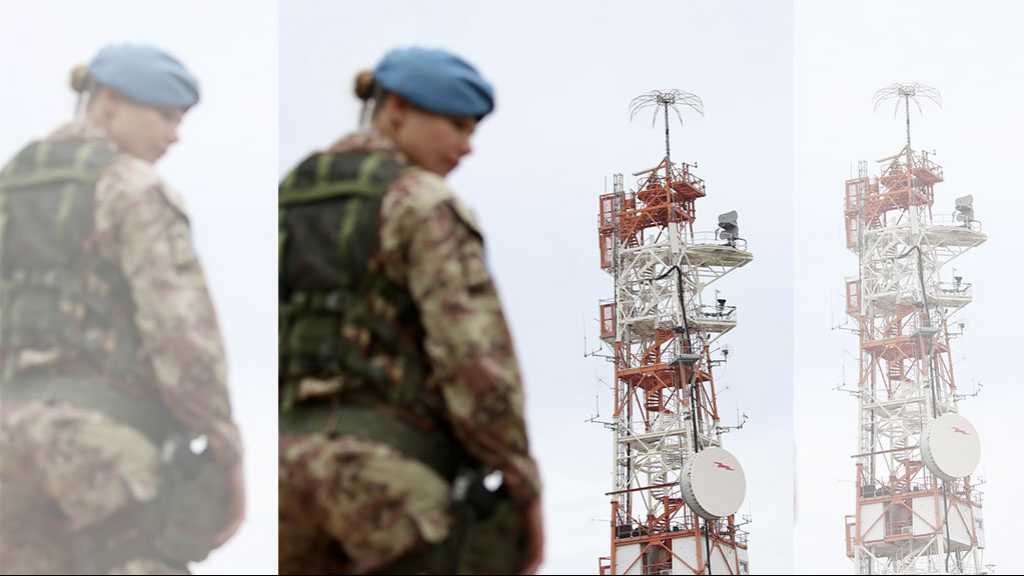
The UNIFIL’s New Ploy: Installing Advanced Cameras atop of Towers

By Amaal Khalil – Al-Akhbar Newspaper
Translated by Staff
The fate of the UNIFIL’s placing advanced cameras over towers in southern Litani River, South Lebanon, has not been decided yet. The scheme the peacekeepers have been trying to pass since three years still hasn’t been approved by the Lebanese Army Command, while the landowners vehemently rejects it.
Since after the July 2006 war, Naqoura has been a test field for major countries, namely the United States, to try the best ways in which it can restrain the forces of resistance, whether civil of military, to stop the hostile acts and guarantee calmness along the border with the Zionist entity. After all the carrot and stick means of the boosted United Nations Interim Force In Lebanon [UNILFIL] failed, its related countries, with the US in their back, started putting new missions.
Many slogans were projected on the successive plans, from the “New Strategy” to “Changing the Rules of Engagement”, to the extent of threatening with amending the articles of the decision to meet Chapter VII. And in between, those plans boost the role of the Bureau of Civil and Humanitarian Affairs, whose mission is to contact local figures and municipalities. Remarkably, a similar bureau was invented within the Lebanese Army departments, as if it is a foreign army on a foreign soil!
All such attempts, however, failed. Naqoura didn’t change the view of many southerners that “it is a force aligned with the ‘Israeli’ enemy and implements its interests in the south Lebanon soil that was liberated thanks to the bloods of the martyrs.” People didn’t spare and chance to express their rejection, notably when the UNIFIL patrols exceed the red lines in roaming and monitoring. The locals didn’t hesitate to attack those patrols exceeding the red lines, as well as to confiscate the cameras and their wireless devices.
UNIFIL countries, especially the United States, don’t have much time to test new policies to protect ‘Israel’s’ security. Along with the economic pressure and intervening in the maritime border demarcation, it set a clear and bold security plan: advanced cameras that substitute the patrols’ failure to reach neighborhoods, valleys and forests.
The annual revision of the UNIFIL’s job last August, before deciding to renew its mission, noted “the necessity to add high-tech observation, thermal monitoring equipment and cameras to monitor any armed movement that violated the resolution 1701.” Hereby, the participating countries guarantee acquiring the information the enemy needs, while their soldiers, who appear in direct confrontations with the people every now and then, remain safe.
According to an informed military source, the scheme to install cameras is being warmed up. The cameras are among the world’s most advanced, provide precise vision around 36o degrees, and connected to an operation center controlled by the UNIFIL’s general headquarters in Naqoura.
The plan focuses on initially installing cameras in spots of strategic geography, such as Shoumariya and Adshit al-Qusayr that overlook al-Hujeir Valley and Sheqif-Khardali Valley, as well as dozens of towns in the Marjeyoun, Nabatiyeh and Bint Jbeil districts. The sites are 29 out of 40, noting that the first thought to install the cameras was recorded in 2009 under former UNIFIL chief Claudio Graziano after the blasts in Tayrfelsay and Kherbet Selem.
After senior UNIFIL officers exhausted their attempts to obtain the approval of the Lebanese Army, the General Security, and other security apparatuses without obtaining an official stance, southern Litani municipals voiced their opposition. The UNIFIL learned about the popular rejection of installing the cameras. Several municipals voiced opposition to “returning to the ‘Israeli’ occupation era, when we used to count our breaths and adjust our movements, and feel we are exposed as if we are wanted.”
“Who guarantees that the cameras’ data won’t be hacked by the ‘Israeli’ enemy positioned a few meters away from the Naqoura operations room?” this question reached the UNIFIL officials. It was raised in case people believed that there is a good will behind the entire project. However, raising the issue of cameras followed canceling the issue of drones the UNIFIL decided to fly over its sites and in several areas in its operations zone southern Litani.
Indeed, does the UNIFIL have the right to use such techniques that frankly expose their spying goals? According to a responsible source, “any change by the UNIFIL’s side on the level of the nature of the tools and the ways to maintain stability and guarantee calmness, should be officially approved by the Lebanese state.” And as long as the state is absent or submitting, the UNIFIL roamed between Beirut and the South over the months the followed the Beirut Port blast, and extracted several containers from ships that docked for it. Did anybody examine the components of this cargo?
The inclusive UN track declines towards “restructuring the UNIFIL’s job in Lebanon not to be under Chapter VII due to the sensitivity it causes, but at a lower degree,” according to the source. The tight economic crisis might help the internationalists in their ploys, as they became more comfortable in consumption and spending after the UNIFIL’s budget was decreased due to the decline in the Lebanese pound’s rate against the US dollar.
Comments



